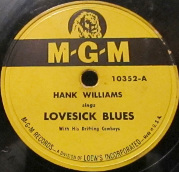"Cold, Cold Heart" is a country music and pop song written and first recorded by Hank Williams. This blues ballad is both a classic of honky-tonk and an entry in the Great American Songbook.

"Lovesick Blues" is a Tin Pan Alley song, composed by Cliff Friend, with lyrics by Irving Mills. It first appeared in the 1922 musical "Oh, Ernest", and was recorded that year by Elsie Clark and Jack Shea. Emmett Miller recorded it in 1925 and 1928, followed by country music singer Rex Griffin in 1939. The recordings by Griffin and Miller inspired Hank Williams to perform the song during his first appearances on the Louisiana Hayride radio show in 1948. Receiving an enthusiastic reception from the audience, Williams decided to record his own version despite initial push back from his producer Fred Rose and his band.
"Ramblin' Man" is a song written in 1951 by Hank Williams. It was released as the B-side to the 1953 number one hit "Take These Chains from My Heart", as well as to the 1976 re-release of "Why Don't You Love Me". It is also included on the 40 Greatest Hits, a staple of his CD re-released material.
"Honky Tonk Blues" was a hit country and western song written and performed by Hank Williams. The original 1952 recording was a major hit, and it later became a hit for Charley Pride.
"Mind Your Own Business" is a 1949 song written and originally performed by Hank Williams.
"I'm a Long Gone Daddy" is a country song written and recorded by Hank Williams. It was released in 1948 on MGM Records and became his second top ten hit.
"Howlin' at the Moon" is a song written and recorded by Hank Williams. It rose to number 3 on the Hot Country Singles chart in 1951. The song also appeared on the soundtrack of alternate history TV series, For All Mankind.
"Wedding Bells" is a song written by Claude Boone and recorded by Hank Williams on MGM Records. It peaked at No. 2 on the Best Selling Retail Folk chart in 1949.
"Settin' the Woods on Fire" was the A-side of a single by Hank Williams, released in September 1952. The song reached number 2 on U.S. Billboard Most Played by Jockeys chart and number 2 on the National Best Sellers chart.
"My Sweet Love Ain't Around" is a song written and performed by Hank Williams. It was his third single on MGM Records released in January 1948.
"You're Gonna Change (Or I'm Gonna Leave)" is a song written by Hank Williams. It was released as a single on MGM Records in September 1949 and reached #4 on the Best Selling Retail Folk Records chart.
"I Just Don't Like This Kind of Living" is a song written by Hank Williams and released as his thirteenth single on MGM Records in January 1950. The song peaked at #5 on the Best Selling Retail Folk Records chart.
"Moanin' the Blues" is a song by Hank Williams. It became his fourth number one single on MGM Records in 1950.
"Dear John" is a song written by Tex Ritter and Aubrey Gass. It is best remembered for being the A-side to Hank Williams' number one hit "Cold, Cold Heart" in 1951 for MGM Records.
"I Won't Be Home No More" is a song recorded by Hank Williams on July 11, 1952. It was released posthumously on MGM Records a year later in July 1953. The song climbed to No. 4 on the US Billboard National Best Sellers chart.
"I'm Sorry for You, My Friend" is a song written and recorded by Hank Williams. It was released as the flipside to his single "Honky Tonk Blues" in 1952 on MGM Records.

Moanin' the Blues is the second album by American country musician Hank Williams, released on MGM Records in 1952.
Pictures from Life's Other Side" is a traditional song popularized by Hank Williams under the pseudonym "Luke the Drifter." It was released on MGM Records in 1951.

"Just Waitin" is a song written by Hank Williams and released as the A-side of "Men with Broken Hearts" in 1951 on MGM Records. It was released under the pseudonym "Luke the Drifter."
"Please Make Up Your Mind" is a song written and recorded by Hank Williams and released as a "Luke the Drifter" single in 1952.



